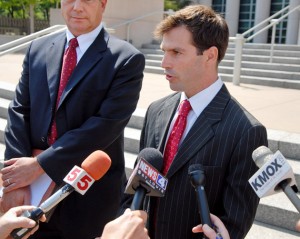If John Edwards goes to prison, then many other politicians should join him, according to the Department of Justice’s logic.
I have a friend, for instance, who during his first campaign unintentionally did almost exactly what Edwards did. After my friend’s first campaign event, the host pulled him aside and said, “Great job! But, can I be candid with you?”
“Sure.” Sure, he said, wondering if his rhetoric had been too strong for some in the room.
“OK. Please don’t be angry,” she said. “But people think you look like a kid, not somebody who could be in Congress. Your suit’s too big. Your shirt is threadbare, your slacks look like rags, and your shoes are scuffed. Basically, you like a boy in your dad’s hand-me-downs. Oh, and you really need a haircut. Your hair looks like a hornet’s nest. You‘ve gotta go see my girl Melissa, she can help you.”
My friend went to Melissa for the duration of the campaign, and her handiwork was by all accounts a huge improvement. Melissa refused to charge him, no matter how vehemently he tried to pay her.
A few weeks later my friend ran into his high school tennis coach, who also commented on his suit. “You can’t go around looking like that,” said the coach, and gave my friend several stylish suits and blazers that he hadn’t worn in years, with instructions on where to get them altered.
Little did my friend know that he had his own Bunny Mellon and Fred Baron, on a slightly smaller scale. And like John Edwards, he neglected to report these gifts on his FEC filings. (FEC rules state that any gift to a federal candidate that is meant to influence an election and which has not been given routinely prior to the benefactor’s candidacy must be reported.)
But if Lanny Breuer, the Assistant AG who is prosecuting John Edwards, has anything to say about it, there will be a precedent set for candidates, even those like my friend – neophytes who know precious little about the intricacies of federal campaign finance law. Any failure to report such gifts would merit a felony charge and, potentially, prison time.
***
Let’s lay out a few pertinent facts about the Edwards case.
A centenarian billionaire gave almost a million bucks to help him hide his pregnant mistress while he ran for president. Edwards failed to inform his campaign treasurer about these gifts.
Who was hurt here – other than Elizabeth Edwards?
We can agree that John Edwards make a mistake by succumbing to the “charms” of a bleach-blonde New Age party-girl who approached him (“You’re so hot”) at a NYC hotel bar one evening. And he compounded this initial mistake with many more along the way. By carrying on an affair as his wife’s cancer progressed, he was appallingly self-indulgent and callous. By running for president while concealing it, he became one of the highest-stakes gamblers in history, literally risking the nation’s well-being on a Houdini-like escape from this tangled web.
But that doesn’t mean the government should have spent two years and millions of dollars to prosecute him.
The crux of the case is that Edwards failed to report the “gifts” as campaign contributions. However, no Bunny-money ever touched any of John Edwards’s campaign or personal accounts. Prosecutors don’t even allege that it did. And apparently Ms. Mellon even paid gift taxes on the money. So should Edwards really be prosecuted and potentially incarcerated for misleading his campaign staff about the fact that a billionaire kept his mistress living in style?
Is there anyone in the country who doesn’t think John Edwards is a world-class heel? Probably not.
Would you like to help pay the millions of dollars for his prosecution and possible incarceration? I didn’t think so.
***
As regular readers know, I lied to federal agents about my knowledge of a postcard that was mailed out by an independent group during my 2004 congressional campaign. With my knowledge, one of my aides had given publicly available information about my opponent’s legislative attendance record to the independent operator, a fact that my aides and I hid from investigators. The wire worn by one of my best friends for two months in 2009 revealed my awareness of the plan to send the mailer, along with the fact that I frequently use four-letter words.
I screwed up. It was really stupid to allow my aides to meet with the man behind the independent effort, and stupider still to lie about it afterwards.
When I resigned from my teaching position at Washington University, resigned from the Missouri Senate, and pled guilty, my family endured a long stream of newspaper and television coverage of the most lurid parts of the tapes; despite their irrelevance to their case, the prosecution had taken care to include the worst snippets in their charging document. The head of the region’s FBI quivered with fury as he condemned the “textbook case of political corruption at its worst,” though I had taken no graft nor offered anyone anything, and though the postcard’s information was accurate. (He soon received a promotion to head the FBI’s Miami bureau.)
My attorneys asked that I be sentenced to two years of teaching civics and coaching basketball at the inner-city charter school I had co-founded a decade earlier. Doing this without salary for two years would’ve cost taxpayers nothing; actually, it would’ve saved about $100K – two years of salary + benefits for a public high school teacher. The school’s board wanted students to see a real-life exemplar of the importance of honesty and sound judgment – a cautionary tale, if you will – and thought that my academic background and legislative experience would benefit students.
Although I pled guilty and revealed all I knew about my own crime, the U.S. Attorney’s office deemed me uncooperative since I did not inform on other elected officials in whom they were interested, or wear a wire to entice these officials to discuss certain alleged unrelated activities. While my cooperating co-conspirators received probation, the prosecution was adamant that I go to prison. The judge sentenced me to a year and a day in prison.
***
As difficult as that period was, it was nothing compared to the widespread public ridicule John Edwards has faced. His life and public image will never be the same. Moreover, he could lose his law license and with it, his livelihood. And of course, he faces a real possibility of prison.
But as RP Founder Jonathan Miller has argued, prison is not an appropriate punishment for someone who lies in order to conceal an affair, as John Edwards did, and as Bill Clinton did before him.
In my city of 319,000 people (St. Louis), 144 people were murdered last year. Some of the convicted murderers will serve life sentences; others will not. Given state budget constraints throughout the nation, many violent criminals will be released early as drug dealers and other non-violent offenders flood the system. For instance, across the river in Illinois, the state released 1700 offenders earlier this year, some of whom were violent and immediately violently recidivated, committing armed robbery, rape, and even murder.
With severe budget problems at the state and federal levels, and with violent crime persisting at sky-high levels in cities like mine, it doesn’t make sense for prosecutors to spend time and money targeting high-profile but harmless “offenders” like Edwards and threatening them with prison time. If the central goal of prosecuting “corrupt” public figures is to remove them from public life, isn’t this overkill? Edwards couldn’t win an election for Chapel Hill dogcatcher anytime soon. Prison is not necessary to deepen his humiliation; he is a walking punch line.
***
This is about much more than John Edwards. The point is that inexperienced candidates probably unintentionally break laws with some frequency, as there is little if any time, money, or effort invested in helping federal candidates understand the arcane and often counterintuitive rules of the game.
Congress doesn’t provide for candidate ethics training, and the notoriously overworked FEC barely has time to deal with the deluge of complaints they receive, let alone offer guidance to candidates preventively. And so the government’s incentive structure is heavily skewed towards the back end: promotions and prestige for those law enforcement personnel who catch the biggest fish.
The public (not incorrectly) associates ambition and power-seeking with politicians. But too often, similarly ambitious investigators focus on the least harmful crimes – provided the alleged culprits have high profiles. As in the Edwards case, law enforcement sometimes seek to justify long and expensive investigations by stretching the law to win convictions in a quest to hang the largest possible scalps on their wall. As the former head of the St. Louis FBI office said in the wake of my case during a television interview about his job: “I love the chase. [It] was fantastic. It was me against them. And the smarter they were, the richer they were, the more I enjoyed catching them.”
But justice is not about adrenaline rushes or personal vendettas. True justice is blind.
***.
So I, for one, am not interested in paying to house, feed, and clothe John Edwards for the next several years. I’d rather he spend the next decade as a full-time volunteer lawyer for the downtrodden – helping people with homes in foreclosure who desperately need counsel; people who have been beaten by a parent or spouse; children who have been crippled by defective products. Instead of prison, let him use the compassion he once demonstrated as a candidate focused on poverty issues along with his evident legal talent for the good of those in need – and as a down payment on his own redemption.












Leave a Reply